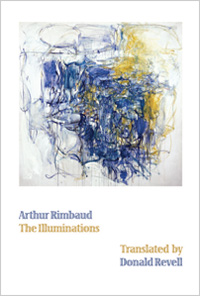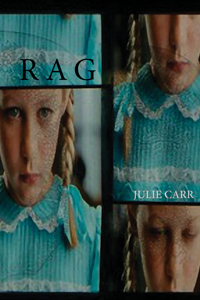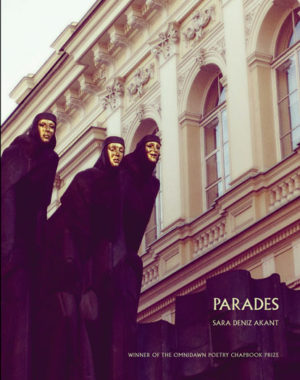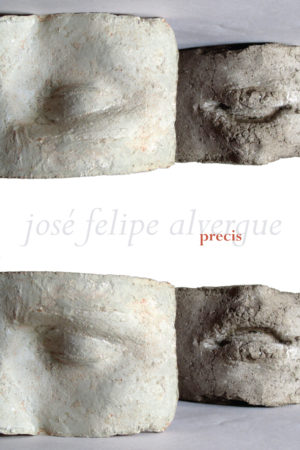Description
Translated by Donald Revell
French on facing pages
With perfect pitch for contemporary readers, Donald Revell’s new translation of The Illuminations offers all the immediacy, hallucinatory surreality, and wit of the intimate particularity that secured Rimbaud’s position as a major poet renowned for his strangely seductive power and innocence. Rimbaud was a dangerous and exhilarating force whose break with literary forms and conventions changed forever the way poems would be read and written. Published with the French on facing pages and with an insightful afterward by the translator, Donald Revell plunges readers into the heart of Rimbaud’s mysterious, revelatory beauty. This lucid and lively translation of a seminal work will show current readers of English all the ways that Rimbaud’s incandescence remains essential and relevant today.
Divided as it still is among its several collectors, the manuscript of Illuminations, “a sheaf of loose, unnumbered sheets,” (Félix Fénéon) was not exactly a book, and may not actually have been called Illuminations, or The Illuminations, but that is another story. In this new translation, Donald Revell becomes neo-alchemical transpositions of Arthur Rimbaud. He fancifully exhibits dreams and hallucinations, new elliptical ultrasounds ending “with angels of fire and ice.” Revell’s dedicated translation presents these astonishing prose poems “bedecked with flags and flowers.”
Norma Cole
Finally, a translation that brings Rimbaud, entire and vital, into English. In his masterful and acutely intuitive treatment of this classic, Donald Revell has caught the immediacy of tone and the jarring, often downright alarming juxtapositions and word choices that make Rimbaud’s work still so unnervingly modern. Revell has made these familiar poems no longer familiar, but strange and raw—what a pleasure to be able to discover them all over again!
Cole Swensen
What a blessing to be given Donald Revell’s revelling again in the work of Rimbaud, this time in The Illuminations, Rimbaud’s ecstatic vision of life on earth and its end. His “further gospel” (following that of Jesus of Nazareth) proclaims not hope, but happiness. And all in Revell’s brilliantly buoyant natural language, and, as in A Season in Hell, the gift of his risky and devoted Translator’s Afterword.
Jean Valentine
About the Author
Reviews
Excerpt
A volatile and peripatetic poet, the prodigy Arthur Rimbaud wrote all of his poetry in a space of less than five years. His poem “Voyelles” invoked synesthesia, marking him as a founder of French symbolism, and his Une Saison en Enfer (A Season in Hell) is considered one of the first works of free verse. His poetry was subconsciously inspired and highly suggestive; his persona was caustic and unstable. Though brilliant, during his life his peers regarded him as perverse, unsophisticated, and youthfully arrogant, and he died virtually indifferent to his own work.
Donald Revell is Professor of English & Director of Creative Writing programs at UNLV. Thief of Strings is his tenth poetry collection, published by Alice James. Twice winner of the PEN Center USA Award for Poetry, he has also won the Academy of American Poets Lenore Marshall Prize and is a former fellow of the Ingram Merrill and Guggenheim Foundations. Additionally, he has twice been granted fellowships in poetry from the National Endowment for the Arts. Donald Revell’s previous translations include A Season in Hell by Arthur Rimbaud (Omnidawn 2007), which won the PEN USA Translation Award. He has also translated The Self-Dismembered Man: Selected Later Poems by Guillame Apollinaire, and Alcools: Poems by Guillame Apollinaire, both published by Wesleyan University Press. His books of essays include Invisible Green: Selected Prose, published by Omnidawn. Former editor-in-chief of Denver Quarterly, he now serves as poetry editor of Colorado Review. Revell lives in the desert south of Las Vegas with his wife, poet Claudia Keelan, and their children Benjamin Brecht and Lucie Ming.
Revell’s version is no more or less accessible than previous translations, and dips into the contemporary idiom are thankfully infrequent and unobtrusive. What distinguishes Revell’s work is its exquisite, carefully modulated musicality. His phrasing is rich and fluid (“The soft perfume of the stars and of the sky and of everything drifts down from the hilltop”) or crisp and strident (“Unsought air and unsought world. Life./ -Was that it, then?/ -And the dream grows cold”), in perfect keeping with the protean, inestimably influential original, making this among the finest of its English translations yet produced.
It’s not strictly rare to find a translation of poetry that is both faithful to the original work and a small masterpiece in its own right, but it’s certainly uncommon. Donald Revell’s translation of Arthur Rimbaud’s The Illuminations is such a collection, a display of the author’s strength and considerable skill as both poet and translator, one on par with David Young’s translations of Rilke and Neruda or Seamus Heaney’s translation of Beowulf.
Cities
What cities! And these are the humans for whom the dream Alleghenies and Lebanons first arose! Chalets of crystal and timber move along invisible trails. Ringed by colossi and copper palm trees, old craters roar tunefully in fires. Love feasts echo across canals. Carillons chime in the gorges. Guilds of gigantic singers gather together in all their finery, haloed like mountaintops. On platforms over chasms, latter-day Rolands trumpet their bravado. From footbridges over the abyss and from the roofs of inns thunderbolts fly like flags. The collapse of idols inundates the sunny uplands where seraphic centauresses sport among avalanches. Higher than the highest crags, an ocean heaving with the eternal birth of Venus, crowded with Orphic flotillas and the music of rare pearls and conches; —the ocean darkens sometimes with rumors of death. On the slopes, harvests of flowers as big as guns and goblets howl. Processions of Mabs in scarlet and opaline robes ascend from the valleys. And over there, with their delicate feet in the waterfall and brambles, deer suckle at Diana’s breast. Suburban Bacchantes sob and the screaming moon burns. Venus enters the caves of blacksmiths and eremites. A cluster of belfries incants the human idea. From bone castles, unknown music comes. All legends change and impulse runs riot through the towns. The paradise of storms subsides. Savages dance incessantly in celebration of the darkness. And once, for an hour, I walked down into the maelstrom of a boulevard in Baghdad, and there I saw workmen singing for joy in the heavy air; I kept moving but never could elude the fabulous ghosts of the mountains where I must seek myself again.
What good arms, what beautiful hour will carry me back to my country, the home of my sleep and my every move?




